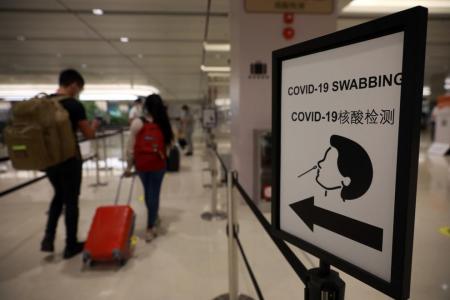Singapore detects first 2 imported Omicron cases
Both travellers were fully vaccinated, did not interact with wider community: MOH
Singapore yesterday became the latest country to detect the Omicron variant, after two travellers who arrived on Wednesday from Johannesburg preliminarily tested positive for the Covid-19 strain while in quarantine.
The cases here mean at least 25 countries have found people infected with the Omicron variant - a number expected to grow. India yesterday also reported its first two cases, both in the southern state of Karnataka.
As countries tighten travel curbs and reintroduce mask mandates, the World Health Organisation said yesterday that vaccines will likely protect against severe illness from the new variant.
As Singapore steps up efforts to screen against the Omicron variant, it said the two travellers from Johannesburg were immediately taken to the National Centre for Infectious Diseases (NCID) after testing positive. Both were fully vaccinated and did not have any interaction with the wider community, said the Ministry of Health (MOH).
One is a 44-year-old permanent resident who was travelling from Mozambique and the other is a 41-year-old Singaporean woman who came from South Africa. Contact tracing is ongoing and close contacts face a 10-day quarantine.
All 19 of the other passengers on the flight were quarantined after arrival and have tested negative for Covid-19.
Since last Sunday, travellers from seven African countries including South Africa have not been allowed to enter Singapore, including those who had obtained prior approval.
Citizens and permanent residents can return but have to stay at a dedicated facility for 10 days.
MODERNA
Vaccine-maker Moderna also said it could have a booster shot targeting the variant tested and ready to file for United States authorisation as soon as March.
"We still need to find out if there's any loss of protection, but we think vaccines will still protect against severe disease as they have against the other variants," said the WHO's chief scientist Soumya Swaminathan.
Omicron was first reported to the WHO from South Africa on Nov 24. Officials have said the early indications were that most cases were mild, with none severe.
Moderna's president Stephen Hoge said he believes booster shots carrying genes specifically targeting mutations in the Omicron variant would be the quickest way to address any anticipated reductions in vaccine efficacy it may cause. "We've already started that programme," he told Reuters.
The WHO has also warned that the world was creating toxic conditions for new coronavirus variants to emerge and spread.
"Globally, we have a toxic mix of low vaccine coverage and very low testing - a recipe for breeding and amplifying variants," WHO director-general Tedros Adhanom Ghebreyesus said.
"That's why we continue to urge countries to... ensure equitable access to vaccines, tests and therapeutics all over the world."
ADDITIONAL INFORMATION: BLOOMBERG, AFP, REUTERS
Get The New Paper on your phone with the free TNP app. Download from the Apple App Store or Google Play Store now



